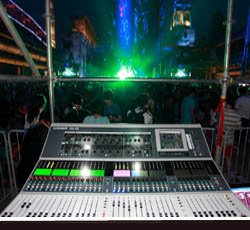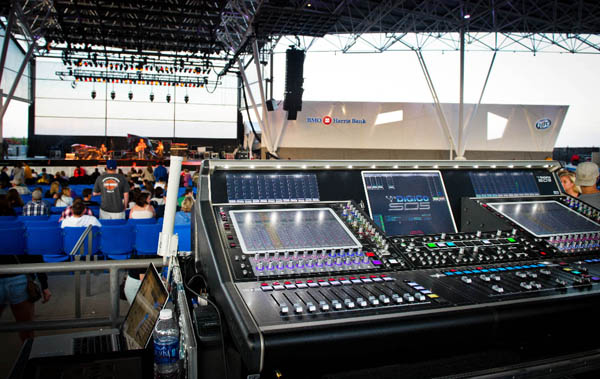
In considering this topic, I did some Q&A with long-time mix engineers Daniel Ellis (David Crowder Band, Jesus Culture) and the aforementioned Chris McMillan.
Here’s what they had to say.
What do you appreciate most from the host system tech in terms of console prep and work flow?
Chris McMillan: I love it when signal flow and busing are simple. That’s really the most important thing. I want to know I’m just responsible for a stereo mix and maybe a send for subs, and everything else is going to be fine. If that’s right, and there’s a solid talkback situation, then we’re golden. It’s also much appreciated when the system tech has thought through the input list and our specific goals and considered what that means in terms of the system configuration. There’s nothing as useless as taking the time to advance a show only to have nothing prepared and no feedback.
Daniel Ellis: I want to see a production console for videos, emcees, and things that I do not need/want in my show file. This also means that I can load and prep my show file in between acts without waiting for the perfect 30-second gap where nothing is happening on stage.
What’s your take on “festival patch”?
CM: In an ideal world, I stay away from festival patch, although this is pretty much only accomplished with a show file. I like channels grouped the way I’m used to so that I see what I need and never know anything else exists. You know, the typical spoiled brat method of engineering.
DE: As a headliner I want my show to be patched per my input list. The only problem with this is that many festival patch guys for some reason can’t get it right the first time so half of the sound check ends up being “fixing the patch.” At least this is how it works at Christian festivals. Sometimes it seems like a random guy has been hired off the street to patch when in essence, patching is one of the most important jobs.
Do you carry a show file if it’s a compatible digital console or do you send it in advance? Or neither?
CM: I carry a show file if it seems like it will make a difference. Sometimes the process of conforming a show file or the time it takes to be convinced it’s correct isn’t worth the effort, because patching and busing can become compromised. Anyway, the acts I work with aren’t doing anything so weird that a default festival scene can’t work as a great starting point.
DE: I always try to know ahead of time what console I’ll be using and have a show file ready. Even if it’s a blank show file built on my laptop, I find that it helps because at least I know where all of my inputs are. If you try to run a 48-input show from a festival console file, you spend the entire time switching between banks trying to remember where everything is. It helps me tremendously to have the same workflow every time even if I’m starting with flat EQ and no processing on anything.
Do you find that “artist EQ” or “output bus processing” is usually enough to get your sound or do you often wish (ask?) for access to the PA processing?
CM: Limited bus-style processing is usually acceptable, if not from a creative standpoint, then from the understanding that everyone else is working off of that same tuning.
DE: Lately I often find myself at an Avid desk at festivals, so I just slap a Waves Q10 (10-band paragraphic EQ plug-in) across the stereo bus. Luckily I haven’t had to do much to the systems themselves. Just two or three small cuts on the Q10 in problem areas and I’m usually happy. If it’s a console that doesn’t work with Waves, I simply use the parametric on the master out.
What makes for a good system tech?
CM: I don’t hesitate to communicate with the system tech about expectations and any changes I feel the PA needs. Most good techs can balance the reality of the promoter and their employer’s expressed interests and still meet your creative and technical needs. A good tech wants a good sounding show in reality and not just on paper.
DE: Good attitude and good ears! And please don’t set up a measurement mic in one spot and put in 15 EQ adjustments.
Kent Margraves began with a B.S. in Music Business and soon migrated to the other end of the spectrum with a serious passion for audio engineering. Over the past 25 years he has spent time as a staff audio director at two mega churches, worked as worship applications specialist at Sennheiser and Avid, and toured as a concert front of house engineer. He currently works with WAVE in North Carolina.

